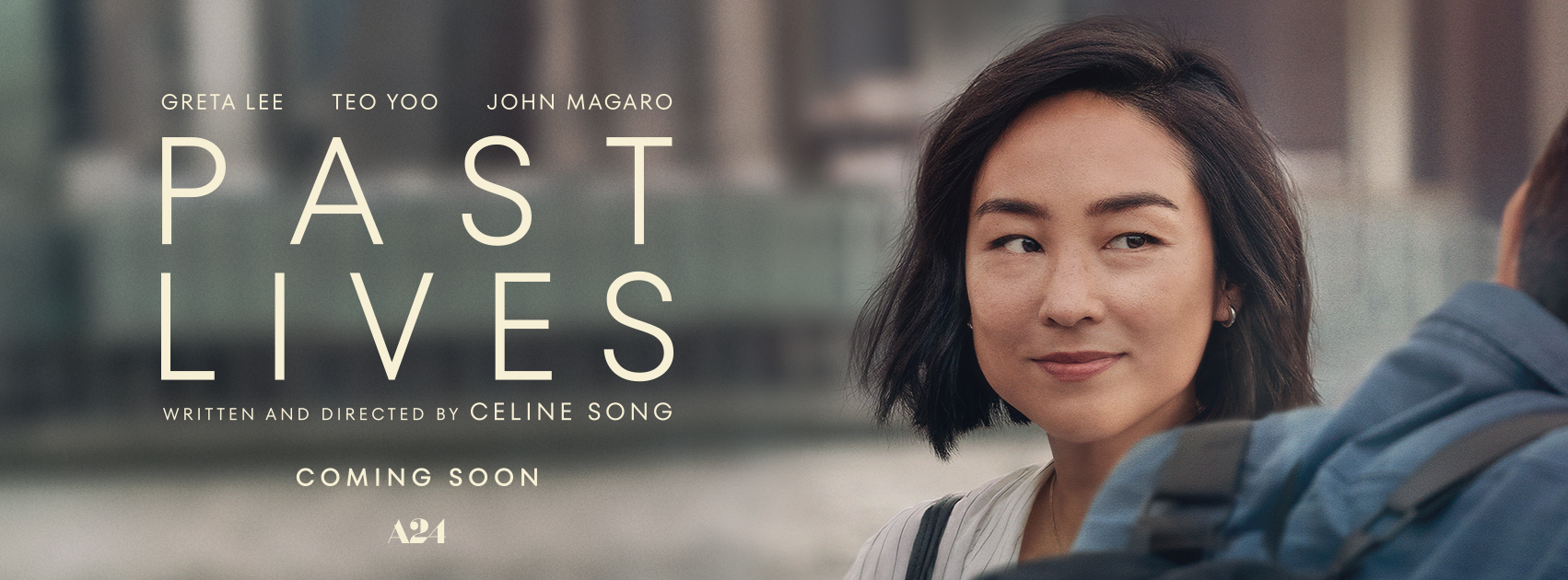
Film Critic Bryony Smith finds A24 and Celine Song’s Past Lives to be an authentic and heartfelt take on the romance genre
Celine Song’s Past Lives is no exception to the fabulous myriad of films production company A24 has brought out this year. The South Korean-Canadian director weaves a beautiful story of emotional growth, romance, and the very human anxiety of questioning “What if…?” as past characters interact with present, and fate is brought into question.
The film is split between three time periods and follows Nora (Greta Lee), at each stage of her romantic life. Starting in her home of South Korea with first love Hae Sung (Teo Yoo), the film moves forward twelve years to New York where she is with current husband Arthur (John Magaro), then moving another twelve years, where the three are brought together.
A beautiful story of emotional growth, romance, and the very human anxiety of questioning “What if…?”
Shot with low saturated colour, the film tracks back to 12-year olds Nora and Hae Sung whose innocent romance feels like a hazy dream, candid and beautifully unfolding in long meandering shots of a leafy South Korea. Whilst the autumnal beauty that has reached the suburbs of Seoul is uplifting, it also hints at the changes about to occur, as Nora soon finds out she must emigrate to Canada with her family.
Another twelve years and Nora is married to husband Arthur, a Jewish American, who she lives with in a modest yet metropolitan New York apartment. Their relationship too is intimately filmed, becoming an aesthetic harmony of Korean beauty in a small corner of the bustling city; content and romantic. And, in a way, part of the heartbreak of the film is because Nora’s husband is so loving whilst being well aware of his potentially precarious position in her love life. He even characterises himself as “the evil white American husband standing in the way of destiny” when Hae Sung travels to New York and he and Nora reconnect a final twelve years later.

This idea of destiny is further referenced in the film as “In-Yun”, a Korean saying, said to occur when fate brings two people together and means they must have had a connection in their past lives. In-Yun thus plays a lot on both Nora’s and a viewer’s mind, as we too feel constantly torn between the two paths each love interest represents. This means that in some places, Past Lives feels like a generic romance film, yet the constant attention to cinematography elevates the viewing and allows the story to be rich in much more than plot or genre. In particular, a masterful shot of Nora and Hae Sung sitting in front of a merry-go-round shows off each actor’s skill in being both comfortable and self-conscious with the background hinting at the uninhibited love their characters once shared.
The constant attention to cinematography elevates the viewing and allows the story to be rich in much more than plot or genre
Part of the reason Yoo and Lee’s chemistry is so convincing is from Song’s decision to not let the two have physical contact until shooting, allowing their first hug, for example, to hold all the same awkwardness and joy as two reconnecting childhood sweethearts. The same is true with Yoo and Magaro, whose first time seeing each other is also when their characters first meet in present-day New York. The unspoken tension between the two men is executed by both actors incredibly well because of this decision and continues throughout the film. Song’s vision of human emotion, said to be inspired partly by the silent reconnection of Marina Abramović and Ulay in Marina Abramović: The Artist Is Present (2012), is carried thus so well by each actor, that it is particularly in moments that have no dialogue, where eyes and gestures are able to speak the most melancholic truth.
Verdict:
Past Lives elevates the stereotypical romance genre that it falls into, giving an intimate insight into the growth and change of its central character as she, like anyone, experiences the fear of not knowing what the “right” path to take is. However, the excellence of this film lies in the combination of plot and cinematography that allows characters and viewers alike to enjoy the flowing conversations and destination-less walks in city parks, local restaurants, or leafy Korean suburbs. Thus, the film suggests the relief from anxieties and ultimatums found in the contentment of just being present, finding genuine, uninhibited joy in people and places and not needing to think about what could or couldn’t have been in a future or past life.
Rating: 8/10
Past Lives is in cinemas now.
Liked reading this review? Check out these other reviews on recent releases from Redbrick Film:
Review: Indiana Jones and the Dial of Destiny | Redbrick Film
Comments